
views
Showing Respect and Kindness

Respect everyone at school. Every student deserves respect so they can learn in a supportive, welcoming environment. The best way to earn it is to show it to other people. You need to respect everyone in your school, including younger students, upperclassmen, friends, strangers, and teachers. Don’t make fun of, tease, or gossip about your peers. Respect other people’s property as well. Never take something that isn’t yours, and if someone lends you something be sure to return it in the condition you received it.
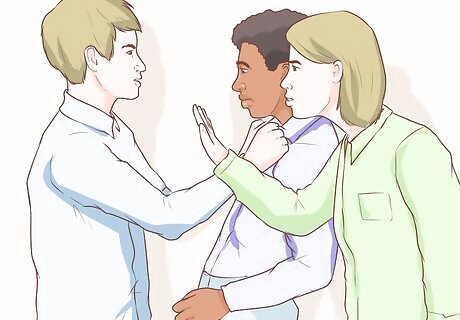
Stand up for yourself and others. If you see someone, whether it’s a friend or a stranger, being bullied, step in and stand up for the person. Similarly, if you’re being bullied, stand up for yourself. Your peers will respect you for standing up for yourself as well as helping others. The worst thing you can do is stand by when someone is being bullied, and not take action. For example, say to the bully “Hey, man, that’s not cool. You shouldn’t talk to Susie like that.”

Listen actively to others. Your peers will respect you if you are someone whom people can come to and feel like they are being genuinely heard. If a friend or classmate wants to talk to you about something, give them your full attention, make eye contact, and demonstrate empathy. For instance, if a classmate tells you that her dog just died, say something like “Wow, I’m really sorry to hear that. I remember how hard it was when my dog, Tally, died last year. Is there anything I can do to help?”

Show kindness and helpfulness. You can demonstrate kindness by holding the door for the person behind you or helping a peer pick up the books they dropped. Don’t single someone out, tease them, or spread rumors. Doing so will not earn you respect from your classmates. If you see someone sitting by themselves, ask them if they want to join you. If they refuse, however, don't push it. They might just want to be alone. If you see someone who looks sad, ask them what's wrong. If they look like they need help with someone, ask them if they want any help.
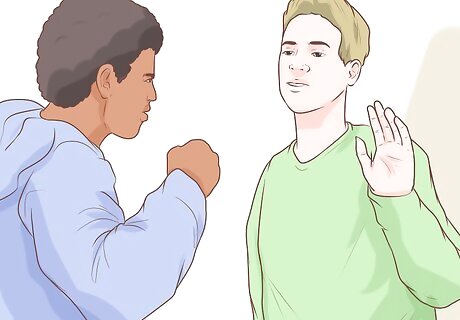
Show your maturity. It can be difficult to be the bigger person in a tough situation, but your peers will certainly respect you for it. If someone attacks or pushes you, be mature and handle the situation the right way. Don’t be afraid to talk to a teacher or counselor if you feel you don’t have the tools or the authority to handle the situation correctly. For example, if a classmate insults you, laugh it off or walk away. Don’t stoop to their level by calling them names or getting into a physical fight.

Avoid inappropriate behavior. Think about how others will react to your actions, and about how your actions make you look to others. Don’t tell jokes that are in bad taste, gossip, or spread rumors. Avoid arguing with your peers and never resort to physical altercations.
Interacting with Your Peers

Show your leadership skills. Being a leader will gain the respect of your peers. Leaders are involved in school activities and work to make positive changes in their school or community. Leaders are also good role models, are confident, and are prepared for all situations. Give your best effort, stay positive, and be friendly and fair. To show your peers you are a leader, you can become the captain of a team or club, join the student council/government, or offer to tutor others in areas you excel in. If you are too shy to lead a club or team, you could become an expert in a certain subject. Your confidence could help mark you as a leader.
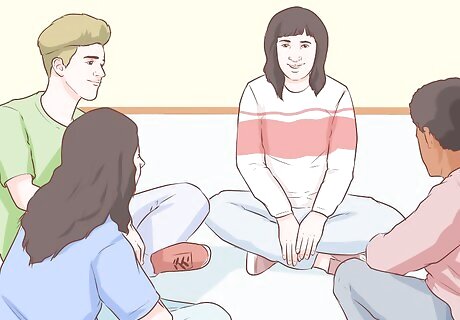
Join organizational teams, clubs, or groups. When people recognize that you are active in school teams or groups, they will respect your efforts and see you as a leader. Try out for the soccer team, join the chess club, or become a member of the drama club. If you don't see a club that you like, ask your school if you can start one up. Some schools will have you create a petition and get signatures from other students.
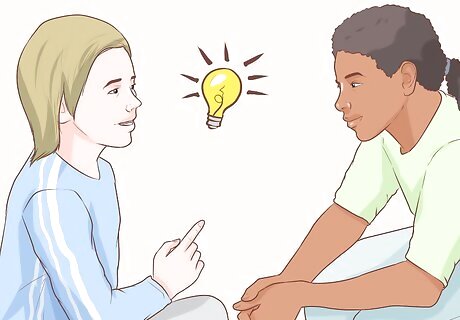
Be open to new ideas. People who are open-minded earn more respect than those that are close-minded and think their way is the only right way to do something. Accept that people come from different backgrounds, religions, and cultures, and while these factors may make people different, they don’t make them better or worse than anyone else. One way to show that you are open-minded is to show interest in other people's backgrounds and ask them questions.

Show others that you relate to them. If you are an asocial person, then you may have a hard time getting the respect you may feel you want from your fellows and peers. Try to find out what you may have in common with your peers, such as strong organizational skills, a talent for basketball, or a love for sci-fi. Take small steps to relate to others, such as commenting on a classmate’s shirt if it has your favorite band logo on it. Another way to show kids you relate to them is to show empathy. For example, if a classmate is upset over a bad grade, think about how you would feel in that situation. Say something like, “I know how frustrating it can be to get a bad grade on something you worked hard on. That happened to me earlier this year in art. Luckily, there’s still time to improve your overall grade in the class, so don’t let it get you down too much.”

Strike up a conversation with your classmates. Starting a conversation with someone you don’t know very well can seem daunting. However, being friendly to others and striking up a conversation can help you earn respect. It’s as easy as sharing something funny that happened to you, or asking about an assignment or project. For example, say “Wow, I’m super tired. I was up late cleaning because my dog knocked over a can of paint in the living room!” You could also say “Have you started your history project yet? I’m thinking of doing mine on the Titanic.”

Accept criticism and compliments graciously. Both teachers and peers will give you criticism during your time at school. If the criticism is clearly constructive and aimed at helping you improve, thank the person! Likewise, when someone compliments you, don’t laugh or brush it off. Instead, show the person that you appreciate their words. For example, if someone gives you constructive criticism, you could say “Wow, thanks for pointing that out, I didn’t notice it before.” For instance, if someone compliments your outfit, say something like “Thank you! I got this at T.J. Maxx. Green is my favorite color.” Sometimes, criticism is plain rude. For example, if someone calls your jacket ugly, you could say "That wasn't very nice," or you could ignore them.

Tell the truth. People who lie will quickly lose the respect of their friends and peers. If you are seen as untrustworthy, it’s hard to be respected. Tell the truth, and own up to it when you make a mistake. Taking responsibility for your words and actions goes a long toward showing others that you are mature and deserve their respect. Sometimes, the truth can be hurtful, so you should use your best judgement. For example, if someone has a really bad haircut, don't tell them that it looks bad!
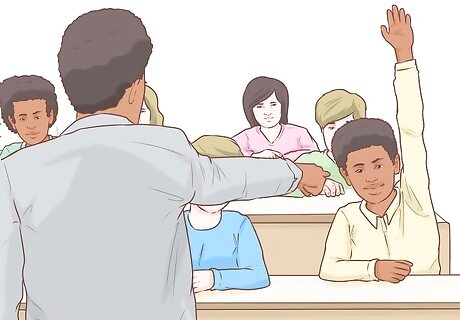
Participate in class. This a no-brainer, because participating means you're letting your voice be heard in front of your whole class. If you have a difficult time answering questions posed by your teacher, try asking questions instead. Other students who were wondering the same thing will be glad you brought up the topic. Class participation can also help improve your grade. Many teachers include participation on the overall grade.
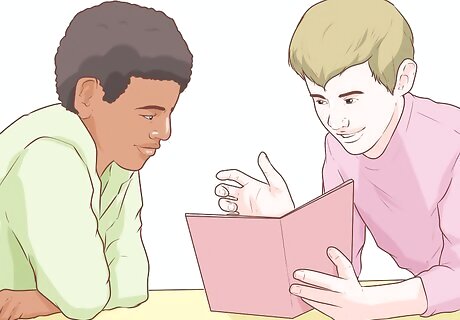
Learn to speak well. Strong communication skills can help you earn your peers’ respect. If you have difficulty getting your point across, try some exercises to help you strengthen your skills. For example, read a newspaper or magazine article and practice summarizing it. This will help you weed out unnecessary information while providing the key points. Another way to improve your communication skills is to take part in a play or take an acting class.
Being Authentic
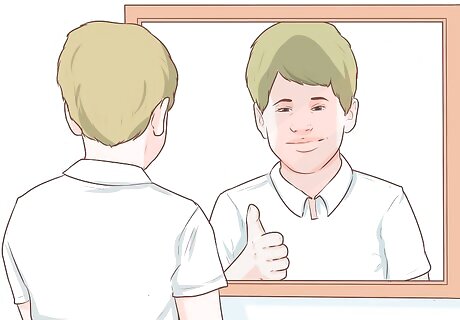
Stay true to yourself. It’s important that you stay true to yourself, and don’t let others influence you negatively. Don’t feel as though you have to change your interests or opinions based on what others like. A strong sense of self will earn the respect of others. For instance, if everyone in your peer group is eating pizza for lunch, and you don’t like pizza, don’t feel as though you have to eat it too. Select what you like, and if someone comments on it, simply say “I’m not a big fan of pizza. I like getting my lunch from the salad bar better.”

Share your talents. Show people what you are good at, and encourage them to do the same. Everyone has unique skills, so don’t worry if you aren’t good at everything you try. Simply showcase the things you do well, and appreciate others that can do things that you may struggle with. For example, if you are a skilled runner, join the track or cross-country team. If someone you know has a great voice, encourage them to join the choir or try out for the spring musical.

Show your smarts. Intelligence is a highly respected trait, so don’t be afraid of letting people see your smart side. You should give all your schoolwork maximum effort, volunteer answers in class, and offer to tutor a student having trouble with something you understand well. Don’t brag or boast about your intelligence, though, just let it speak for itself. Sometimes, you will make mistakes. If someone proves you wrong, thank them, or say something like "I stand corrected!"
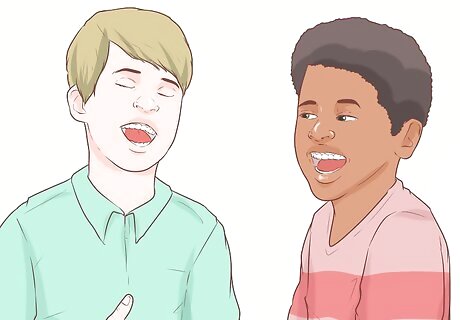
Demonstrate your humor. Make others laugh by telling them a good joke or a funny story. Watch funny shows or listen to comedy skits for inspiration. You can even do an Internet search for funny jokes so you have a few on hand at any given time. Just avoid jokes that are inappropriate, or that demean or make fun of different genders or racial groups. Don’t take yourself too seriously. If something embarrassing happens, just brush it off with a smile and a laugh. Take note of other people's reactions. What's funny to one person may not be funny to the next.

Be confident. Confidence goes hand in hand with respect. Accept and love yourself for you who are, flaws and all. Dress in clothes that make you feel good and always have a smile ready to share with friends or peers.













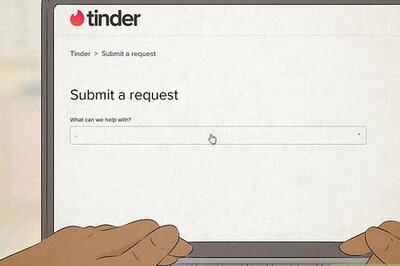




Comments
0 comment